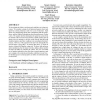Free Online Productivity Tools
i2Speak
i2Symbol
i2OCR
iTex2Img
iWeb2Print
iWeb2Shot
i2Type
iPdf2Split
iPdf2Merge
i2Bopomofo
i2Arabic
i2Style
i2Image
i2PDF
iLatex2Rtf
Sci2ools
106
click to vote
ATAL
2015
Springer
2015
Springer
Adapting the Social Network to Affect Elections
We investigate the effect a social network could have on voting outcomes. We consider a group of self-interested agents where each agent has a strict preference order over a set of outcomes. Each agent votes strategically, taking into consideration both her preferences, and her (limited) information about the preferences of other voters. We assume that the information the agent has comes from her friends in the social network and from a public opinion poll. If agents were not strategic at all, the social network (and the poll) would not matter, since they would just vote according to their preferences. However, if the agents deviate and vote strategically the network plays a great effect. To measure this effect, we focus on iterative voting with Plurality voting rule. We show, both in theory and in simulations, that for many networks, adding a linear number of edges can make any outcome the winner. We view our results as yet another indication to the effect that a central organizer, s...
Related Content
| Added | 16 Apr 2016 |
| Updated | 16 Apr 2016 |
| Type | Journal |
| Year | 2015 |
| Where | ATAL |
| Authors | Sigal Sina, Noam Hazon, Avinatan Hassidim, Sarit Kraus |
Comments (0)

